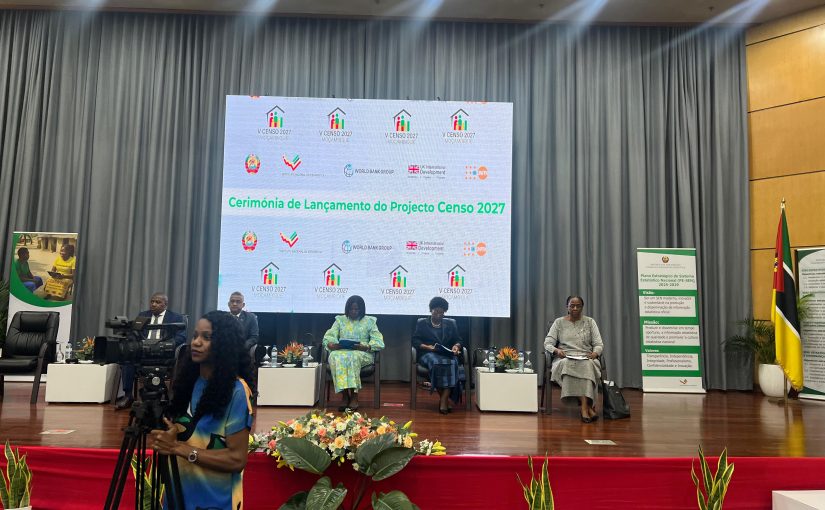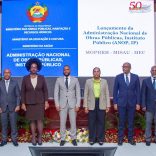Mozambique: 13th-month for public workers maintained but no carry-over allowed
Mozambique: 2027 population census to cost $110M, 36M people expected – INE

Photo: UNFPA Mozambique / X
The Mozambican National Statistics Institute (INE) expects to register 36 million inhabitants in the 2027 population census, ten million more than in the 2017 census, spending €96.2 million on the operation, it was announced on Monday.
When presenting the organisational structure of the plan for the fifth general population and housing census, INE President Elisa Ana Mónica Magaua said that growth is expected compared to the 2017 operation, when just over 26 million inhabitants were registered in Mozambique.
The general population and housing census will take place from August 1–15, 2027, for the first time using digital platforms, with results available in six months.
“The first challenge is to conduct a digital census in a country with little digitalisation, scarce qualified human resources, partial electricity and internet coverage and poor access roads,” said the INE president.
The population census, said Elisa Ana Mónica Magaua, is estimated to cost just over US$110 million, with the World Bank already guaranteeing initial funding of US$12.7 million.
“This census project will ensure that every person — regardless of location, age, gender or condition — is counted, seen, and included.”
– UN Resident Coordinator, Catherine Sozi, @ launch of #2027Census Project 🇲🇿 funded by @UKinMozambique #LeaveNoOneBehind #SDGs pic.twitter.com/OhAsiLULi6
— UNFPAMoçambique (@UNFPAMocambique) June 2, 2025
.The INE president also gave assurances that conditions were in place for conducting the census of people displaced by terrorist attacks and other climatic events.
The Prime Minister of Mozambique, Maria Benvinda Levi, who was present at the launch of the fifth population census, called for everyone to get involved in the activity, arguing that it is an initiative that aims to assess the country’s progress in different areas.
“The population and housing census will provide essential information that can assist in the design of programmes aimed at reducing inequalities in access to opportunities and in the definition of assertive public policies, as well as in achieving the goals set out in the United Nations Sustainable Development Goals and the African Union’s Agenda 2063,” said the prime minister at the launch of the census.
In May, the Mozambican government announced that the 2027 population census will determine “how many children, young people, adults and elderly people there are in the country. The population census will therefore enable us to speak with certainty about the development process and will also allow us to better plan for the different dynamics and different needs that the public has in relation to our country”.
“Mozambique has adopted a ten-year population census to understand the territorial population dynamics that occur in order to understand who we are, where we are, how we are and where each person actually is, so that later, with the results that this will give us, the Government can define better policies,” said Cabinet spokesman Inocêncio Impissa, at the time.
The census “will help to better plan to solve the problems of the general public,” he insisted.
The National Statistics Institute (INE) estimates that the Mozambican population will reach 34 million by 2025, compared to just over 26 million in the last census, conducted in 2017.
Hoje, a Primeira-Ministra lançou oficialmente o Projecto do V Recenseamento Geral da População e Habitação (RGPH-2027)!
Um recenseamento digital, inclusivo e estratégico para o futuro do país 🇲🇿#Censo2027 #EstatísticasMoçambique pic.twitter.com/xAR17aTDNx
— UNFPAMoçambique (@UNFPAMocambique) June 2, 2025
📍 Happening now:
Official ceremony to launch the 2027 Population and Housing Census Project !
Watch live on INE’s Facebook 🇲🇿
🔴 👉 https://t.co/1QT8STIBNY#Census2027 #Mozambique pic.twitter.com/l4zEZdCQEe
— UNFPAMoçambique (@UNFPAMocambique) June 2, 2025
We are honoured to support @UNFPAMocambique in launching Mozambique’s 2027 Population & Housing Census 🇲🇿, a key step for inclusive, evidence-based development.
Made possible through the demography programme, this effort shows the power of data for planning and growth. https://t.co/XmU5LqAvX1
— UK in Mozambique 🇬🇧🇲🇿 (@UKinMozambique) June 2, 2025












Leave a Reply
Be the First to Comment!
You must be logged in to post a comment.
You must be logged in to post a comment.